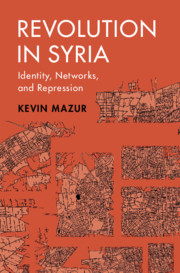Crossref Citations
This Book has been
cited by the following publications. This list is generated based on data provided by Crossref.
Drevon, Jerome
2020.
Can (Salafi) jihadi insurgents politicise and become pragmatic in civil wars? Social movement restraint in Ahrar al-Sham in Syria.
Third World Thematics: A TWQ Journal,
Vol. 5,
Issue. 3-6,
p.
189.
2021.
When People Want Punishment.
p.
258.
2022.
Big Data and the Welfare State.
p.
233.
Lacher, Wolfram
2022.
How does civil war begin? The role of escalatory processes.
Violence: An International Journal,
Vol. 3,
Issue. 2,
p.
139.
2022.
Resisting Extortion.
p.
248.
Pearlman, Wendy
2023.
How Homeland Experiences Shape Refugee Belonging: Rethinking Exile, Home, and Integration in the Syrian Case.
International Migration Review,
Vol. 57,
Issue. 1,
p.
160.
Darwish, Housamedden
2023.
From Peaceful Civil Movement to Civil War and Sectarian Polarization: A Critical Review of Kevin Mazur’s Revolution in Syria: Identity, Networks, and Repression.
International Sociology,
Vol. 38,
Issue. 5,
p.
552.
Clarke, Killian
2023.
Which protests count? Coverage bias in Middle East event datasets.
Mediterranean Politics,
Vol. 28,
Issue. 2,
p.
302.
Toska, Silvana
2024.
Revolutionary Emotions.
Üngör, Uğur Ümit
2024.
The Tadamon Massacre: Archiving Violence through the Perpetrators’ Gaze.
Visual Anthropology,
Vol. 37,
Issue. 1,
p.
56.
Rouhana, Toni
2024.
A Critical Juncture Lived Otherwise? The Case of the ‘Cedar Revolution'.
Ethnopolitics,
p.
1.
Khoury, Rana B.
and
Siegel, Alexandra A.
2024.
Civil Organizing in War: Evidence from Syrian Facebook Communities.
Perspectives on Politics,
p.
1.
Lee, Sean
2024.
Social classification as a combat sport: some ethical concerns in coding for identity.
Conflict, Security & Development,
Vol. 24,
Issue. 6,
p.
757.
BERMAN, CHANTAL
CLARKE, KILLIAN
and
MAJED, RIMA
2024.
From Victims to Dissidents: Legacies of Violence and Popular Mobilization in Iraq (2003–2018).
American Political Science Review,
Vol. 118,
Issue. 1,
p.
213.
Suechika, Kota
2025.
Measuring ‘state-diffusion’ in post-conflict authoritarian Syria evidence from the 2021 public opinion survey.
Mediterranean Politics,
Vol. 30,
Issue. 2,
p.
294.



